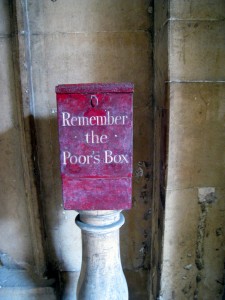In the Holy Qur’an, Allah (subhanahu wa ta`ala, exalted is He) contrasts the believers and disbelievers not only in their faith, but also in specific actions. A recurring example is the act of feeding the hungry. Allah (swt) frequently describes the righteous believers as those who feed the needy, as in the Qur’an where He says: “And they give food in spite of love for it to the needy, the orphan, and the captive, [saying] ‘We feed you only for the countenance of Allah. We wish not from you reward or gratitude'” (76:8-9). On the other hand, Allah (swt) describes the regret of the disbelievers as they endure the punishment of the Day of Judgement, as they say, “Nor did we used to feed the poor” (Qur’an, 74:44). Because Allah (swt) uses feeding the poor as a means of distinguishing between the believers and disbelievers, it is essential for our success on the Day of Judgement that our behavior in this life is similar to that of the believers whom Allah (swt) praises.

Alhamdulillah, our community takes Allah’s command to give charity seriously and is generous throughout the year. We often fulfill Allah’s command to feed the hungry by sending donations online or attending fundraisers; yet we miss an important aspect of giving charity: being aware of the poor in our locale, checking up on them, and donating not only our wealth, but also our time and effort.
This act of checking up on the poor is made especially difficult for many Muslims in the U.S. because poverty is quarantined to certain neighborhoods or cities. Thus, we may go for weeks without running into someone needy. In contrast, other countries around the world do not have segregated poor communities, and you can find yourself running into wealthy and needy people all on the same block.
The importance of going out of our way to help the needy is demonstrated by the Sahaba’s actions. During the caliphate (khilafah) of Abu Bakr As-Siddeeq (radi Allahu `anhu – may Allah be pleased with him), there was an elderly, blind woman living alone in Madinah. `Umar ibn Al-Khattab (ra) found out about her and came to ask if he could be of any service to her. She responded that she needed no one’s services because another man came everyday at Fajr (dawn prayer) to clean her home, prepare her food, and fetch her water. `Umar (ra) was curious to know who this man was, so he came early the next day and hid near the house to discover the identity of the man who beat him to this `ajr (rewarded action) – only to find that it was the Khalifah himself, Abu Bakr (ra).
An important lesson that we learn from this occasion is that both Abu Bakr and Umar (ra) went out in person to help this elderly woman. They could have easily sent one of their servants or paid someone to do the job. However, they sought to get the full reward by personally helping the needy. Another lesson that we learn is that both of them checked up on people in their locale and immediately detected anyone in need. Umar (ra) was especially known for doing this during his khilafah and feeling the weighty responsibility towards the Ummah. However, we see that in this case, Umar (ra) is not the khalifah, yet he is still actively monitoring the status of his locale and offering his aid to those in need.
During the month of Dhul-Hijjah, Allah (swt) especially encourages us to feed the needy from our udhiya (sacrifice): “That they may witness benefits for themselves and mention the name of Allah on known days over what He has provided for them of [sacrificial] animals. So eat of them and feed the miserable and poor.” (Qur’an, 22:28) In this verse, Allah (swt) mentions that we gain worldly and spiritual benefits through Hajj, like remembering Allah, meeting other Muslims from around the world, and increased commerce. He orders us to demonstrate our gratitude for His blessings by sharing with the needy.
With Eid Al-Adha and Thanksgiving falling only one day apart this week, we have a golden opportunity to fulfill Allah’s command to feed the needy from our udhiya and to take it one step further in emulating the Sahabah by feeding the hungry in our neighborhood and doing it in person.
Our Goal for the Next Two Weeks
Share the blessing of Allah (swt) with the needy in your locale, whether it be by establishing or volunteering in a soup kitchen, or by cooking food at home and distributing it to the homeless and needy in your city. Try to increase awareness of this project by involving you family, friends, youth groups and halaqa‘s.
What do you plan to do? Please share your success stories!
May Allah (swt) empower us all to be musliheen (those who make amends and bring goodness to society) and to follow in the footsteps of our beloved Prophet (s) and his companions, may Allah be pleased with them all. Ameen.

jazaki Allahu khayran for the beautiful reminder.
This is the beauty of our religion Islam. may Allah Almighty rewrd you abundantly.
MashaAllah, astute observation that American society is socio-economically divided making poverty less evident (and also because Americans have different standards of living). Oprah once did a special on American poverty after Hurricane Katrina and called it America’s “dirty little secret,” as if it was a new discovery of some sort. This article was a great reminder to be more in-touch with one’s environment and being attune to others needs. Ameen to the dua! JazakiAllah khair for this post!